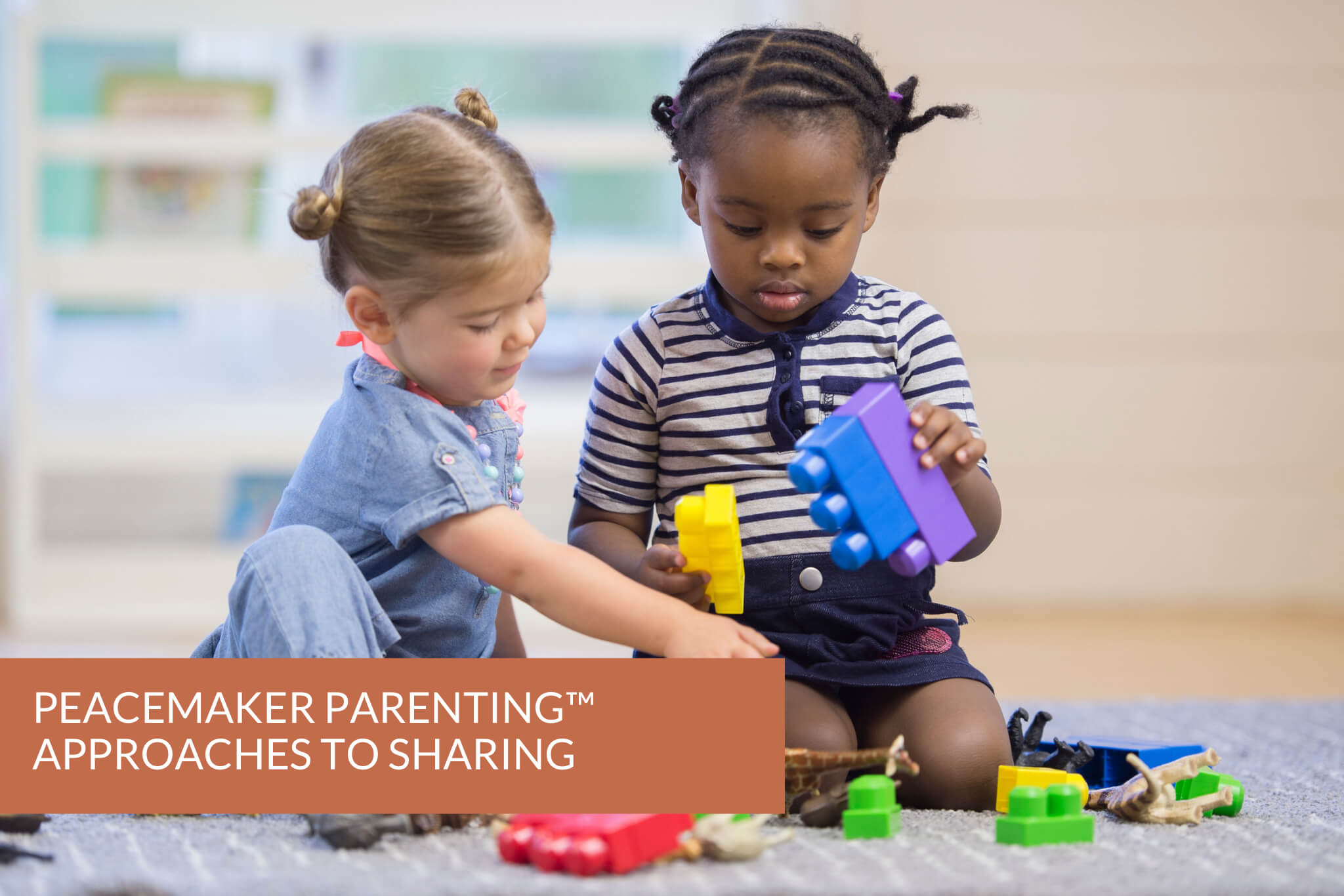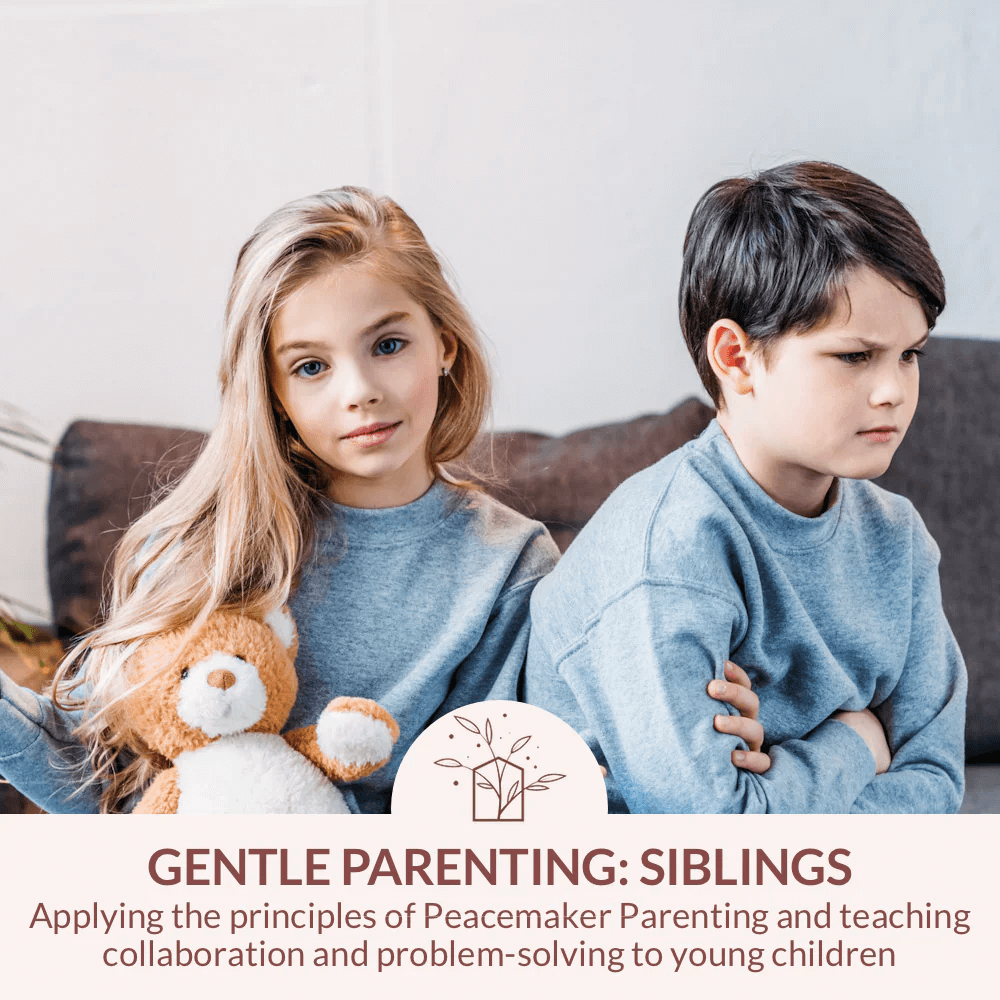
"Annie (2.5 year old) was playing with some Paw Patrol toys when Jackson ( 4.5 year) old noticed and promptly walked over and grabbed them out of her hand. Of course she screamed and started fighting for them back. In the past I would have scolded Jackson and put him in time out, but after learning about Peacemaker Parenting I had a few strategies on hand to try. "Oh no! Jackson you want to play with Chase and Rubble, but Annie's not done." I said as I took the toys from him. I was actually fairly calm (I'm learning - it doesn't come naturally), and I said it in the narrator voice. "Annie, I bet that surprised you and was frustrating!" I said as I handed them back to her." She nodded and started to run off, but I held her arm. "Jackson, if you want a turn you can ask her, do you know what to say?" Jackson was upset that I handed the toys back his sister and his arms were crossed. He shook his head and grunted. "You can say, "Annie, when you're done, I want a turn, please." I looked at Annie. "Sweet girl, when you're done playing with Rubble and Chase I want you to bring them to me and Jackson. We're going to be in his room, okay?" She nodded and ran off. I gave Jackson all of my attention. "It's hard to wait sometimes, isn't it?" He nodded. "I understand that, sometimes I have a hard time waiting too and I want to help you this time to build your waiting muscles. Do you want to color or read while we wait?" I tried to give him a choice, but he had a different idea. "I want to play with my Rescue Bots!" he said, running off to his room. Within a few minutes Annie came toddling in with the Paw Patrol toys and handed them to me, so I praised her for remembering to bring them and gave her lots of snuggles. I'm so glad I had more tools than just putting my little guy in time out for being impulsive.
- Claire, Mom of 2
When it comes to teaching our children to share, parents usually have really great goals, and a few mismatched expectations. Peacemaker Parenting™ can help you align your parenting goals, family values, and reasonable expectations so that you can disciple your children towards generosity of spirit.
Biblical Compass
"God loves a cheerful giver." - II Corinthians 9:7
As Christian parents our goal is not merely to teach our children to share - it is teach them generosity of spirit. We want them to share cheerfully, not out of compulsion or fear of consequences. This takes years of gentle discipline and guidance, coaching our kids with what to say, how to say, and how to navigate conflict.
Developmental Compass
- Children start forming friendships around age 3
- While some toddlers will practice giving and taking back, most children are not developmentally able to share (with the other person's perspective or feelings in mind) until around ages 5-7. This means that during the toddler and preschool years, they will need lots of practice and coaching.
- 43% of parents believe children should have mastered sharing by age 2
- Research shows that forced sharing actually delays the development of sharing skills and generosity.
- Children who feel secure in their ownership of something and who choose to share develop lasting generosity.
Peacemaker Parenting™ sharing strategies and why they work
Instead of: "I'm setting a timer. You each get five minutes with the bear. If you can't share, no one gets the bear."
Try: "You both want the bear. I'll hold him while we think of how to solve this problem together."
Why: It definitely feels more convenient to insert our solution and make sure our kids learn to share! But that fails to teach conflict resolution, generosity of spirit, or empathy. Instead of putting away the toy or automatically setting a timer, give them the opportunity to work together to come up with a solution to their problem. And remember: the goal is that is mutually acceptable to both of them. Their solution may not always seem equitable to you, but if they are both okay with it, it's the right solution!
...
Instead of: "Your little brother really wants that truck. Can't you just give it to him? You're the older sibling, you should know how to share."
Try: "Brother is really wanting a turn with that truck when you're finished using it." Turns attention to younger brother. "I hear how much you want it! You really want to use it right now! Sometimes patience is hard! I'm here for you. We can play with something else while we wait, or just be together until the truck is available."
Why: Forcing an older child to immediately hand over their toys to a vocal younger sibling is a surefire way to build resentment over time. You can try talking about this at a neutral time and seeing if your kids would like to create a family rule where each person's right to play with a common-area toy as long as they want to is protected. Once "finished," though, the other sibling may use it as long as they want. This can help diffuse shaming and create an sense of fairness that works for some families.
...
Instead of: "Your friends are coming over--remember they're the guests, so you need to share all your toys. You want them to have fun, right?"
Try: "Do you have any special toys you don't want your friends to touch? Let's take a moment to put them somewhere off-limits before our friends arrive."
Why: Sharing toys with friends is typically part of play dates, but it's very natural for them to feel protective over certain toys and helping them protect their most special items can reduce anxiety and help them be more relaxed about sharing the remaining toys.
A version of this can also work for siblings: create a special shelf or bin ("Keeping Box") in the closet to house their most special toys, out of the “common area toy” circulation. This can give kids autonomy and actually promote physical safety as well (legos and toddlers don’t mix!).
When it comes to sharing, the real work is found in helping children learn to wait. Taking turns will someday give way to cheerful generosity, but until then, cultivating patience and problem-solving skills is the important work in a flourishing, peaceful home.
Looking for more tips on how to handle sibling squabbles. In honor of National Sibling Month on April 10, our Gentle Parenting: Siblings workshop is FREE with the purchase of any workshop or bundle! Just use the code SIBLOVE at checkout.













0 Comments